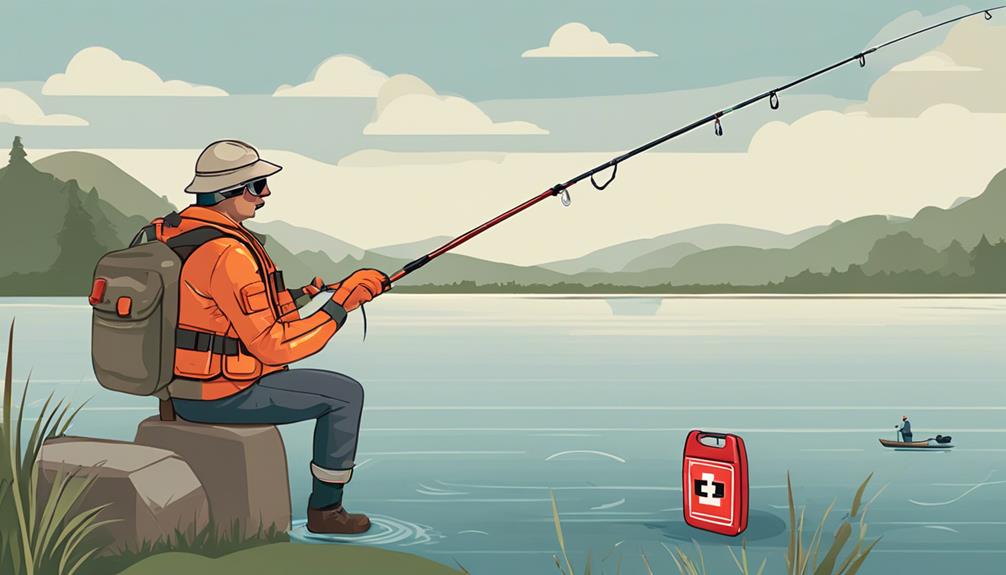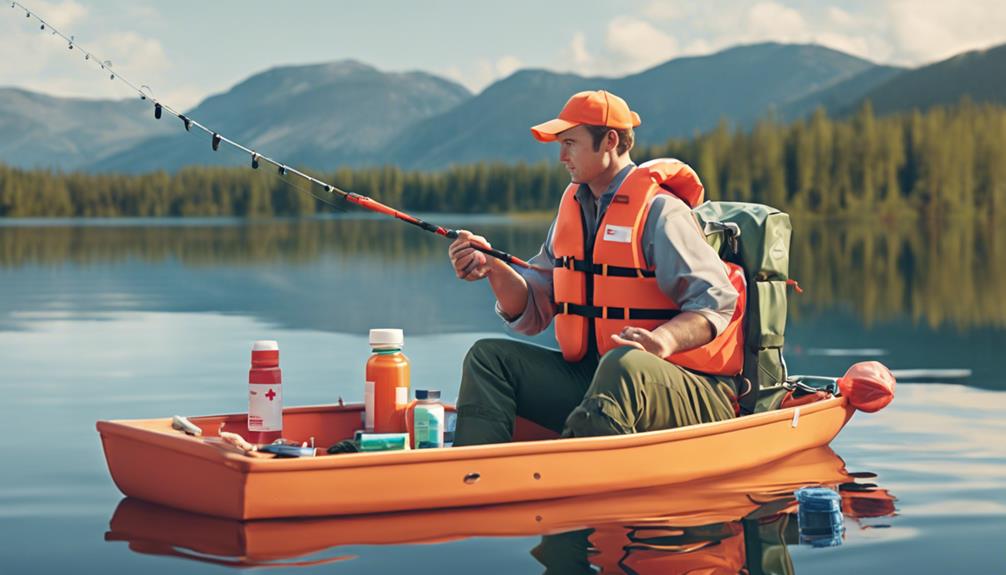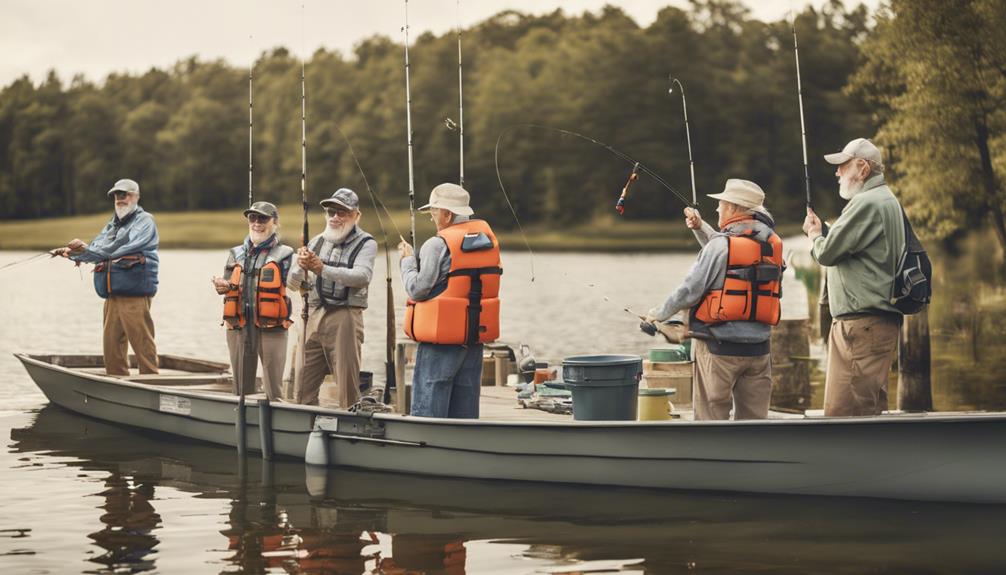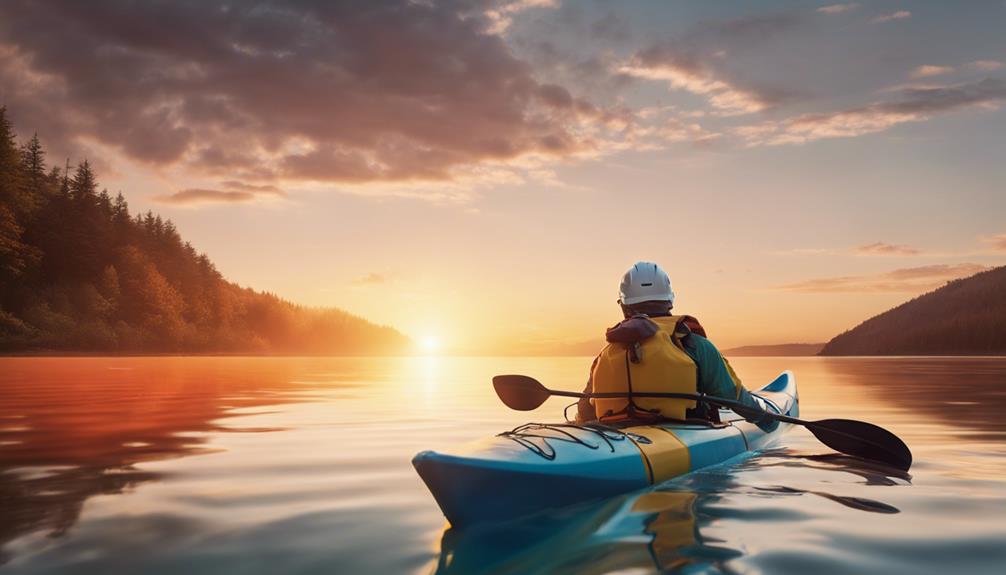Imagine this scenario: you're out on a serene lake, casting your line, when suddenly a storm rolls in. What should you do to ensure your safety and enjoy a worry-free fishing trip?
Understanding the top fishing safety practices is crucial for any angler. From selecting the right gear to knowing how to handle emergency situations, these practices can make a significant difference in your fishing experience.
Dive into this discussion to equip yourself with essential tips that could save lives and enhance your angling adventures.
Proper Gear Selection
When selecting your fishing gear, ensure it suits the type of fish you aim to catch and the environment you'll be fishing in. Proper gear selection is crucial for a successful and safe fishing experience. Start by maintaining your gear regularly. Check your rods, reels, lines, and lures for any signs of wear and tear. Replace any damaged items to prevent malfunctions while out on the water. Clean your gear after each use to prolong its lifespan and ensure optimal performance.
Equipment storage is another important aspect to consider. Store your fishing gear in a cool, dry place to prevent rusting and deterioration. Avoid leaving your gear exposed to harsh weather conditions or direct sunlight for extended periods. Proper storage not only protects your equipment but also maintains its functionality for future fishing trips.
Investing in high-quality gear is worthwhile, as it can make a significant difference in your fishing experience. Make sure your equipment is suitable for the specific fish species you're targeting and the type of fishing you plan to do. By taking care of your gear and storing it properly, you can enjoy fishing with peace of mind knowing that your equipment is in top condition.
Weather Awareness
Stay informed about the weather conditions before heading out for your fishing trip to ensure a safe and enjoyable experience. Weather awareness is crucial for a successful fishing outing. Here are some key points to consider:
- Check the Forecast: Before you head out, make sure to check the weather forecast for the day. Look out for any potential storms, high winds, or other severe conditions that could affect your safety on the water.
- Pack Appropriate Gear: Be prepared for any weather changes by bringing along the necessary gear. Always have rain gear, such as a waterproof jacket and pants, in your fishing bag in case of unexpected showers.
- Monitor Wind Conditions: Pay attention to the wind conditions as they can impact your fishing experience. Strong winds can make it difficult to control your boat or cast your line. Be cautious and consider postponing your trip if winds are too strong.
- Stay Alert to Changing Conditions: Weather can be unpredictable, so stay alert to any sudden changes in the weather while you're out fishing. Keep an eye on the sky for dark clouds or sudden shifts in wind direction, which could signal an incoming storm.
Safe Casting Techniques
To ensure safe and effective casting while fishing, practice proper casting techniques to improve your accuracy and prevent any potential accidents. Casting accuracy is crucial to avoid hooking yourself or others unintentionally. Start by ensuring there's enough space behind you before casting to prevent tangling the line in nearby trees or rocks. Maintain control of the line throughout the casting motion to guide the bait or lure accurately to your desired spot.
When casting, focus on a smooth and controlled motion rather than using excessive force. Jerky movements can lead to the line snapping or the hook flying off unexpectedly. Keep your wrist firm but flexible, using your arm to propel the bait forward steadily. Pay attention to the wind direction and adjust your casting angle accordingly to prevent the line from getting tangled or blown off course.
Proper line control is essential for accurate casting. Avoid letting too much slack line out, as this can result in a tangled mess when you try to reel it back in. Keep the line taut between your rod tip and the bait, ready to set the hook at any moment. Practice different casting techniques to improve your accuracy and distance, ensuring a successful and safe fishing experience.
Emergency Preparedness
Practice safe casting techniques to ensure a successful fishing trip, and in case of emergencies, being prepared is key. When heading out for a day of fishing, it's crucial to have a plan in place for any unexpected situations that may arise.
Here are some essential tips to help you be ready for emergencies while out on the water:
- First Aid Kit: Always carry a well-stocked first aid kit tailored to treat common fishing-related injuries like cuts, hook wounds, or minor burns. Make sure you know how to use the items in the kit effectively.
- Emergency Contacts: Create a list of emergency contacts including local authorities, coast guard, and a trusted friend or family member. Keep this list in a waterproof container or store it in your phone.
- Communication Plan: Establish a communication plan with your fishing buddies or someone onshore. Agree on check-in times and signals to indicate if help is needed. Ensure everyone knows how to operate any communication devices on board.
- Emergency Procedures: Familiarize yourself with emergency procedures specific to your fishing location. Know how to signal for help, use distress signals, and navigate back to shore in case of engine failure or other emergencies.
Boat Safety Measures
Ensure your boat is equipped with essential safety measures to protect yourself and others while out on the water. One of the most crucial safety items on any boat is life jackets. Make sure you have enough properly fitting life jackets for every person on board. It's not just about having them on the boat; ensure everyone wears a life jacket, especially when conditions are rough or unpredictable.
In addition to life jackets, practicing emergency drills can be a lifesaver in critical situations. Conducting drills for emergencies like man overboard or fire can help everyone on board understand their roles and responsibilities. Being prepared and knowing what to do in emergencies can make a significant difference in ensuring everyone's safety.
Regularly check your boat's safety equipment to ensure everything is in working order. This includes inspecting life jackets for any damages, making sure fire extinguishers aren't expired, and testing signaling devices. Being proactive about safety measures can prevent accidents and save lives.
Sun Protection Tips
Make sure to shield yourself from the sun's harmful rays while enjoying your time fishing by following these sun protection tips.
- Skin care: Apply a broad-spectrum sunscreen with an SPF of 30 or higher to all exposed skin. Reapply every two hours or more frequently if sweating or swimming. Don't forget often-missed areas like your ears, neck, and tops of your feet.
- Protective clothing: Wear lightweight, long-sleeved shirts and pants to cover your skin. Dark or bright colors are more effective at blocking UV rays. Consider clothing with built-in UPF (Ultraviolet Protection Factor) for added sun protection.
- Hats and sunglasses: Put on a wide-brimmed hat to shade your face, ears, and neck. Sunglasses with UV protection help shield your eyes from harmful rays. Look for sunglasses that block 100% of UVA and UVB rays.
- Seek shade and time your outings: Try to fish early in the morning or later in the afternoon when the sun's rays are less intense. Take breaks in the shade to give your skin a rest from direct sunlight.
Respect Wildlife Guidelines
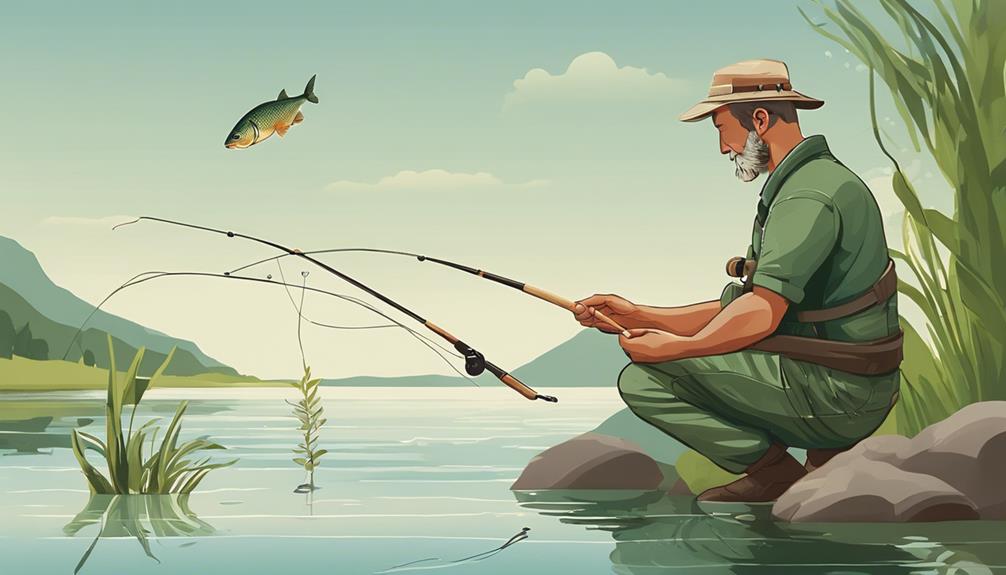
When interacting with wildlife during your fishing excursions, always adhere to respectful guidelines to ensure the well-being of the animals and ecosystems. Respecting wildlife is crucial for maintaining the delicate balance of nature and preserving the habitats where fish thrive. When engaging in wildlife interaction while fishing, follow these conservation practices to minimize your impact on the environment.
Firstly, avoid feeding wild animals while fishing. Feeding wildlife can disrupt their natural foraging behaviors and diets, leading to health problems and dependency on human food sources. Additionally, refrain from approaching or touching animals you encounter during your fishing trips. Maintaining a safe distance not only protects you from potential harm but also reduces stress on the animals, allowing them to behave naturally.
Furthermore, be mindful of your waste and always clean up after yourself. Properly dispose of any trash or leftover bait to prevent wildlife from ingesting harmful materials. Fishing lines, in particular, pose a significant threat to animals if left behind, so make sure to collect and properly discard any discarded lines or gear.
Fishing Buddy System
Respect the importance of safety and camaraderie by implementing the Fishing Buddy System during your angling adventures. Fishing with a buddy not only enhances the fun but also ensures that someone has your back in case of any emergencies that may arise during your fishing expedition.
Here are four key aspects to consider when utilizing the Fishing Buddy System:
- Emergency signals: Establish clear emergency signals with your fishing buddy before starting your angling trip. This could include specific hand gestures or whistle patterns to indicate that immediate help is needed.
- Communication methods: Make sure to agree on communication methods with your fishing buddy. Whether it's using walkie-talkies, cell phones, or just designated meeting points at specific times, effective communication is vital for a successful Fishing Buddy System.
- Check-in points: Set up regular check-in points with your fishing buddy to ensure that both of you're safe and accounted for. This can be especially crucial when fishing in remote or unfamiliar locations.
- Buddy up for tasks: When handling equipment, navigating tricky terrain, or reeling in a big catch, always buddy up. Having a partner to assist can prevent accidents and make the fishing experience more enjoyable for both.
Frequently Asked Questions
How Can Anglers Prevent Injuries While Handling Fish?
To prevent injuries while handling fish, remember to use proper handling techniques. Be cautious of fish spines which can cause harm if not handled carefully.
Always support the fish properly, avoiding any sudden movements that could lead to injury. By taking these precautions, you can ensure a safe and enjoyable fishing experience while also protecting yourself and the fish from harm.
Are There Any Specific Regulations or Guidelines for Fishing in Different Bodies of Water?
When fishing in different bodies of water, it's crucial to follow specific regulations and guidelines. Make sure you have the required fishing license for the area and understand local regulations.
Stay safe on the water by following water safety and boating guidelines. Always be aware of any restrictions or rules that apply to the specific body of water you're fishing in to ensure a safe and enjoyable experience.
What Should Anglers Do if They Encounter Dangerous Wildlife While Fishing?
If you come across dangerous wildlife while fishing, stay calm and slowly move away. Avoid sudden movements that may startle the animal.
Keep a safe distance and never try to approach or feed them. Be aware of your surroundings and know how to identify potentially harmful species.
Carry bear spray or other deterrents if fishing in areas with known dangerous wildlife. Always prioritize your safety and take necessary precautions to prevent encounters with dangerous animals.
How Can Anglers Safely Transport Their Catch Back Home?
When you're ready to head home with your catch, remember to store it properly to keep it fresh. Use a cooler with ice or a live well if you have one.
Clean your hands and any equipment you used with soap or disinfectant wipes to maintain good hygiene practices. This will help ensure your fish stays safe to eat and prevents any contamination.
Transport your catch home securely and refrigerate it promptly.
Are There Any Specific First Aid Techniques Anglers Should Know for Common Fishing-Related Injuries?
If you're out fishing, it's crucial to know basic wound care and CPR techniques. For injuries like cuts or hook accidents, clean the wound with water and apply a bandage.
In case of emergencies, learn CPR to assist someone in need. Always be prepared and have basic first aid supplies on hand.
Conclusion
Remember, when it comes to fishing safety, being prepared and aware is key.
Make sure you have the proper gear, stay informed about weather conditions, practice safe casting techniques, and have a plan in case of emergencies.
Always prioritize boat safety, protect yourself from the sun, respect wildlife, and never fish alone.
By following these top fishing safety practices, you can enjoy a day on the water with peace of mind.
